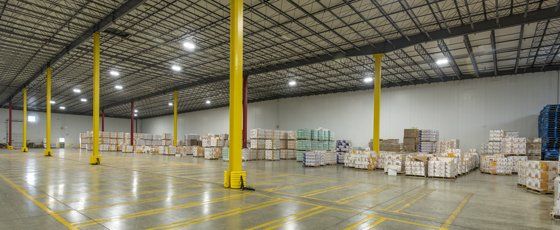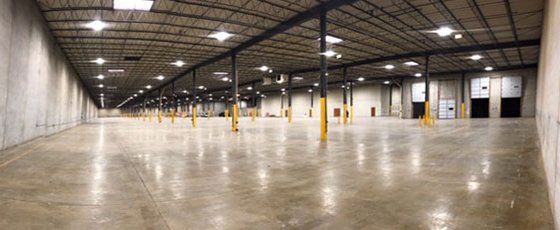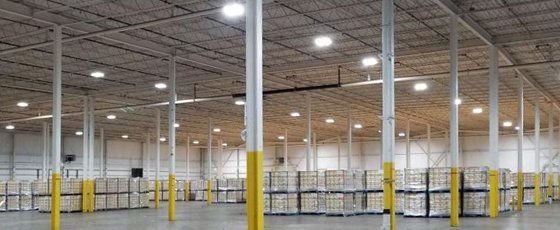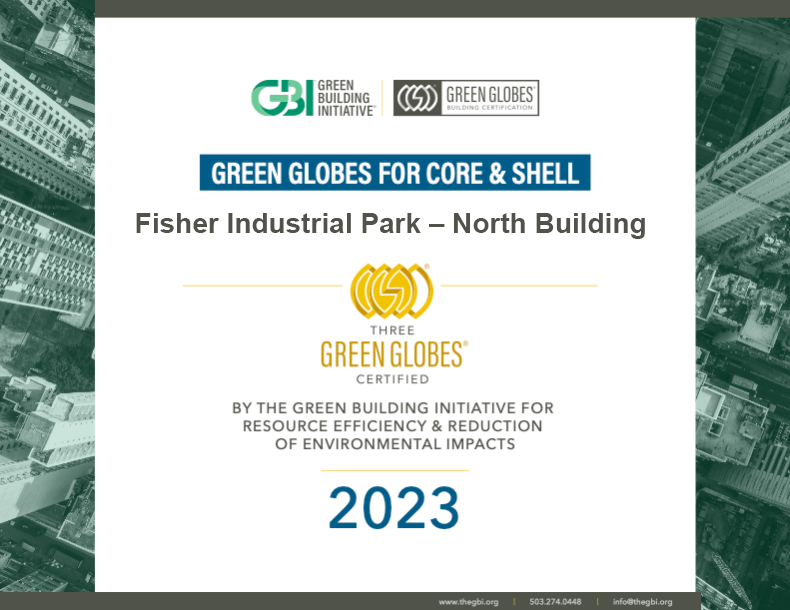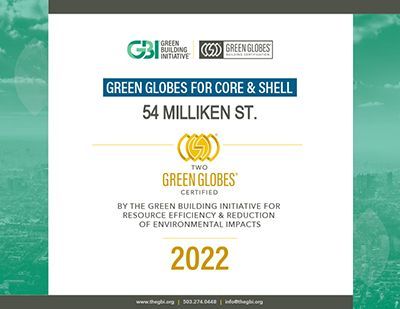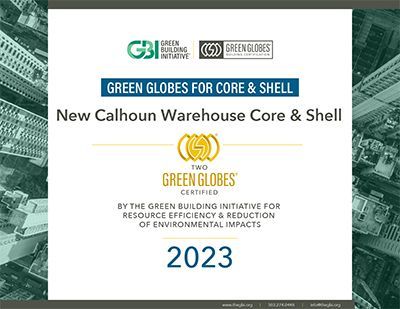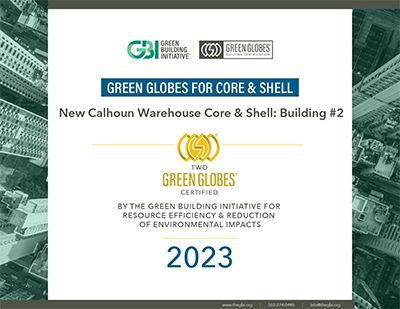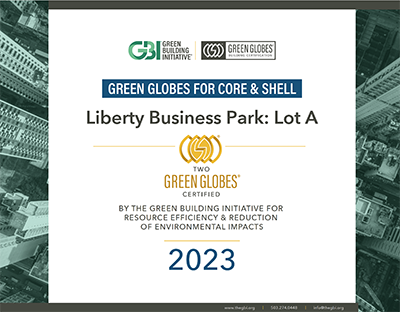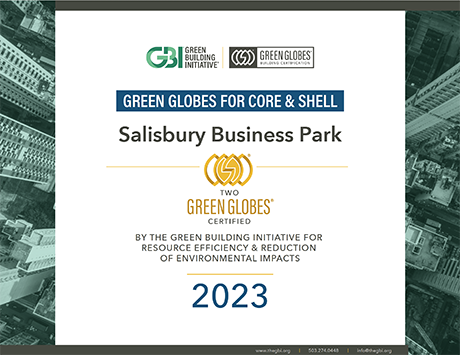Plymouth was selected by the Green Building Initiative as the winner of their 2023 Specialty Award “Leadership in Core & Shell” for our development of the Fisher Industrial Park – North Building. GBI chose Plymouth for the award because of Plymouth’s “out of the box” thinking, reduction of environmental impact, and superior resource efficiency achieved from the project.
Environmental Stewardship
We take seriously our commitment to reducing our impact on the environment. We begin by analyzing where our greatest impacts are, and then we align our improvement efforts to focus on those areas.
Our Most Material Environmental Priorities Are Energy Consumption, GHG Emissions, and Water Use
We are committed to assessing what the most material priorities are for us as we pursue our ESG efforts. GRESB (Global Real Estate Sustainability Benchmark), SASB (Sustainability Accounting Standards Board), TCFD (Taskforce on Climate-related Financial Disclosures), and other major ESG frameworks highlight that the most material environmental concerns for the real estate sector are (1) energy consumption, (2) its associated greenhouse gas (GHG) emissions, and (3) water consumption. Therefore, those most material priorities are the focus of our environmental initiatives.
This year we were successful at achieving reductions in all three of these most material areas, decreasing our energy use, GHG emissions, and water consumption.
We Reduced Our Energy Consumption
Throughout our dedicated Plymouth offices this past year we made efforts to reduce our use of electricity and natural gas. In 2022, we comprehensively measured all of our energy use, with a plan to use 2022 as our baseline year to assess progress going forward. This year, we again measured all our energy consumption for the year across all four dedicated offices in Boston, Columbus, Jacksonville, and Memphis. Comparing our consumption this year against our 2022 baseline, we are gratified to report that our efforts throughout 2023 resulted in meaningful progress.
We had set as our goal for 2023 to reduce our energy consumption by 5% – and we achieved a 9.8% reduction in electricity use and a 21.5% reduction in our use of natural gas.
We Reduced Our GHG Emissions 11%
Greenhouse gas (GHG) emissions are the primary driver of climate change, and thus reducing them is a fundamental goal for us. In order to do that, we focused this year on reducing overall energy consumption, thereby lowering the resultant GHG emissions. We set as our goal to reduce our GHG emissions by 5%. Through a combination of decreasing our energy use overall, and in particular reducing our energy consumption in those geographical areas that have the highest GHG emissions from electricity generation, we were able to achieve a reduction of almost 10 metric tons of CO2e – an 11% decrease – compared to our baseline year 2022.
We Offset 60% Of Our GHG Emissions
We set a goal last year to offset 50% of our GHG emissions this year, on the path to achieving 100% Net-Zero carbon emissions by 2025. Through a combination of reducing our GHG emissions by 11% and obtaining appropriate carbon credits, we were able to offset 60% of our GHG emissions this year. We remain on track to achieve Net-Zero carbon emissions by 2025. We also have a larger goal of achieving Net-Zero carbon emissions for our entire portfolio – which would include all of our Scope 3 emissions – by 2040.
We Reduced Our Water Consumption More Than 20%
We pursued a number of efforts to reduce our water use throughout 2023. Aiming for a goal of reducing water consumption by 5%, across our four dedicated offices these efforts led to a decrease of more than 22% in our water consumption – saving over 65,000 gallons of water.
2024 Improvement Targets
- Decrease Intensity of Electricity Consumption 5% Compared To 2023
- Decrease Intensity of Natural Gas Consumption 5% Compared To 2023
- Decrease Intensity of GHG Emissions 5% Compared To 2023
- Offset 75% of Our 2024 GHG Emissions, On The Path To Net-Zero Carbon Emissions by 2025
- Decrease Intensity of Water Consumption By 5% Compared to 2023
Four Key Environmentally-Related Policies
As part of the active development of our ESG efforts, our board of directors authorized management to formulate comprehensive environmentally-related policies which were adopted as of November 1, 2022:
- Environmental Impact Policy
- Climate Change Policy and Strategy
- Environmentally Responsible Site Selection Policy
- Green Building Policy
We Continue To Make Progress On Our Major Environmental Initiatives
In addition to conservation and reduction efforts within our own operations, we have also been prioritizing four major environmental initiatives that will reduce the environmental impact of all the buildings in our portfolio: LED lighting retrofits, environmentally beneficial roofing, solar power, and green building. We continued to make progress on all four this year.
LED Lighting Retrofits – As of the end of 2023, we have converted 14.9 million square feet – 43.6% of our entire portfolio – to LED lighting. Conventional lighting consumes about 19% of all the electricity commercial buildings use, and LED lights consume 75% to 90% less electricity than conventional lighting. Therefore, we estimate that this transition thus far of nearly 45% of our portfolio to LED lighting reduces the overall total electricity consumption across our portfolio by 8% each year. Looking ahead to 2024, we plan to continue to expand our LED retrofitting efforts and have a goal of converting 47% of our total portfolio by year end.
"By retrofitting nearly 45% of our portfolio with LED lighting, we reduced the overall total electricity consumption across our portfolio by an estimated 8% in 2023."
Environmentally Beneficial Roofing Initiatives
As of the end of 2023, we have installed:
- 17.7 million square feet of “cool roofs” – 51.8% of our total portfolio
- 2.2 million square feet of silicone roof renewals – 6.3% of our total portfolio
Cool roofs are reducing the energy consumed by our tenants, lowering carbon emissions, and increasing the life span of our air conditioning units. The silicone roof renewals decrease energy consumption and reduce landfill waste. For 2024, we have plans in place to add upwards of 500,000 square feet of new cool roofs to our portfolio.
Major Solar Power Installations – We currently have two major rooftop solar power installations in place, capable of producing a total of 1.6 megawatts of renewable energy:
- 0.5 megawatt system in Peachtree City, Georgia
- 1.1 megawatt system in our new Portland, Maine warehouse
In 2023 we sold a property in Philadelphia that had a 1.0 megawatt rooftop solar array, thus reducing our number of rooftop solar arrays by one compared to last year. In our Chicago metro area, we are currently in contract to install more than six new megawatts of solar energy.
Green Building – Gold Status This Year In The Green Lease Leaders Program; Additional Green Globe Certifications For Our New Developments
We are continuing to implement our green building approaches, through both our green lease program and our green building certifications for 100% of our new development, renovations, and new tenant improvements.
In our renovation of the old original Fisher Body plant, for example, we recovered and recycled 648 tons of steel and eliminated 442 old lighting fixtures and replaced them with 288 LED lights.
Our new 68,000 square foot warehouse in Portland, Maine, is Green Globes certified and features a 1.1 megawatt solar installation on the roof, all LED lighting, a cool roof, water-efficient native landscaping, and low-flow plumbing fixtures.
Last year, we achieved an important goal that we had set. We earned Silver recognition in the Green Lease Leaders Program for implementing sustainable leasing practices, utilizing green lease clauses, promoting energy efficiency, and collaborating with tenants to achieve significant sustainability improvements in building operations.
This year, we expanded on those commitments and achieved Gold Status in the Green Lease Leaders Program. This recognition highlights our active, ongoing commitment to using our leasing practices to contribute to reducing the environmental impact of our buildings.
After certifying all four of our new developments through the Green Building Initiative’s Green Globes program in 2022, we followed up in 2023 by achieving certification of our two newest developments, both in Jacksonville, Florida. This continues to fulfill our commitment that 100% of our new developments since 2022 will achieve Green Globe certification. All six of these certified developments feature LED lighting, occupancy sensors, cool roofs, water-efficient native landscaping, and low-flow plumbing fixtures.
To ensure effective green building practices and enable us to be able to continue to achieve the Green Building Initiative “Green Globes” certification for all new construction and major renovations from 2022 onward, we are committed to:
- LED lighting
- High-efficiency mechanical equipment
- Native water-efficient landscaping
- Cool roofs
- Low VOC paint and finishes
- Low-flow plumbing fixtures
- Lighting controls/occupancy sensors
- Recyclable carpet
- Eliminating toxic materials and waste in construction, renovation, and demolition
Plymouth Wins Green Building Leadership Award
As We Look Ahead, The Challenge of Measuring Our Scope 3 GHG Emissions Remains
While we will continue to measure and reduce our own energy consumption, and as we continue adding more environmentally beneficial improvements to our buildings – making them more energy efficient and thereby decreasing their contribution to climate change – we are keenly aware that the bulk of GHG emissions that arise from our business activities come from our tenants’ energy consumption. Although their use of energy is something that we do not control, we are committed to gathering the data on their energy consumption and their use of renewable energy and supporting them in making improvements.
Being able to collect the data from them presents a range of logistical, statistical, and relationship challenges that we are continuing to work on. We are endeavoring to collaborate with our tenants in order to obtain their consumption data and to adjust our leases going forward to make this energy data collection part of the expectation. In addition, variations in metering, use of space, chain of control, and more, create difficulties both collecting and validating the data. So, we are working to build the measurement system that solves all these challenges and is able to provide us with reliable and valid data about our Scope 3 emissions. We hope to have a working measurement system for these Scope 3 GHG emissions by the end of 2024.
Similar to our tenants’ energy consumption, the greatest environmental impact from our business activities in terms of water is not our own use of water in our offices, but the water consumed by our tenants. Again, although this water consumption is not under our control, we are committed to measuring it, both to support our tenants and to reduce our buildings’ water footprint. In order to do that, we are working on the same data collection, technical, and relationship challenges that we face with the energy consumption data. We hope to have a working measurement system for water consumption across our entire portfolio by the end of 2024.
Green Lease Leaders

The Green Lease Leaders Program is a recognition and certification program designed to showcase property owners and landlords who are implementing sustainable and energy-efficient leasing practices in their buildings.
The program provides guidance and resources to building owners to help them incorporate environmental goals and sustainability measures into their lease agreements. By participating in the program, Plymouth demonstrates our commitment to sustainability and benefits from improved tenant satisfaction, increased energy efficiency, and reduced operating costs.
Plymouth earned Silver recognition from Green Lease Leaders in 2022 for implementing a range of these sustainable leasing practices; this year we expanded on those commitments and achieved Gold Status. This recognition highlights our active, ongoing commitment to using our leasing practices to contribute to reducing the environmental impact of our buildings.
Green Globes Certification

During 2021, Plymouth Industrial REIT joined the Green Building Initiative (GBI). GBI is a nonprofit organization and American National Standards Institute (ANSI) Accredited Standards Developer dedicated to improving building performance and reducing climate impacts. Founded in 2004, the organization is the global provider of the Green Globes® and federal Guiding Principles Compliance building certification and assessment programs.
At Plymouth we set a goal to have 100% of all our new developments be green building certified from 2022 onward. Since 2022, we have had six new developments and we have achieved Green Globe certifications for all six. Administered by GBI, Green Globes is a nationally recognized green rating assessment and certification system that ensures projects meet clearly defined criteria in seven assessment areas: Project Management, Site, Energy, Water, Resources, Emissions, and Indoor Environment. In addition to evaluating documentation in each of these performance areas, the Green Globes certification process includes an onsite assessment with a third-party Assessor to verify implementation.
Climate Change Policy & Strategy
Climate change is a critical threat to all of us. Plymouth is committed to reducing the impact our buildings have on the environment by improving energy efficiency, increasing our use of renewable energy, and improving climate resilience.
We are continuing to understand the science and the challenges of climate change and to build our strategy on the basis of sound science and the realities facing all of us. We recognize that the average global temperature has risen more than 2º F since 1880, and we are convinced that we must join in the effort to keep the world below the thresholds detailed by the Intergovernmental Panel on Climate Change (IPCC). Because about one-third of all greenhouse gas emissions come from buildings, we believe we have the opportunity to make a meaningful difference. Climate change is also the most material ESG priority for our investors and many of our key stakeholders. Therefore, tackling climate change is among our highest priorities
Our Climate Change Strategy consists of four major components.
Governance Surrounding Climate Change
Our Sustainability Committee of the Board of Directors, chaired by Independent Director Caitlin Murphy, and our Management Committee for Environment & Sustainability, chaired by CEO Jeff Witherell are responsible for designing and overseeing our climate policies, strategies, action
plans, and progress.
Strategy For Reducing Greenhouse Gas (GHG) Emissions and Climate Risk
We are committed to a climate change strategy of:
- Assessing our energy consumption and Scope 1 and Scope 2 greenhouse gas (GHG) emissions
- Assessing our Scope 3 GHG emissions
- Increasing our energy efficiency and reducing our energy consumption
- Increasing our use of renewable energy
- Educating our tenants about energy efficiency and working with them on their efforts to reduce their energy consumption
- Proactively managing our climate-related risks and building increased resilience
Managing Climate Change Risk
We approach risk management associated with climate change in two overlapping phases:
- Identification and assessment of our climate risks – both short- and long-term
- Integration of climate risks into our enterprise risk management system
Climate Change Metrics and Targets
Our goal is to achieve Net-Zero carbon emissions from our own operations by 2025 and across our entire portfolio (including our Scope 3 emissions) by 2040. We have annual targets to enable us to achieve this long-term goal. The core metrics for which we have annual goals and that we track are:
- Electricity and natural gas consumption
- Scope 1 and Scope 2 GHG emissions from our own operations
- The percentage of all our energy consumption that comes from renewable energy sources
- We are developing our best approaches for measuring the Scope 3 emissions from our tenants’ energy consumption across our portfolio of assets

